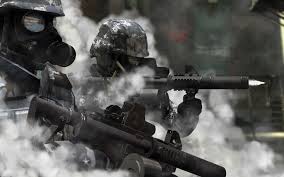Resistance to the military’s involvement in controlling the Outlands, as the semi-abandoned area of the USA’s southwest were dubbed in 2045, was individual and easily swept aside. The encroachment of military control on the weakened governments of remaining cities, those not devastated by hurricanes Lempert or Dexter, began insidiously as help.
The riots after hurricane Dexter in 2048 brought about the first instances of large scale martial law in major cities. When the unrest ended, the military pulled back, releasing control to the democratic municipal governments. Because they were heading to reorganize the Outlands.
 Whether the military used the Outlands as a testing ground for their authority, or if their actions there led to the idea to restructure the country is a matter for historians to debate. But by 2049, the military controlled most agricultural land leading up to the edges of cities. They organized the farmland by relocating skilled farmers from the Outlands, and removing less efficient squatters. It took only a few, potentially staged, raids on food shipments for the military to take over and escort shipments. State governments accepted the help as a necessity that removed one thing from the overwhelming list of changes facing leaders dealing with the impacts of climate change, and the disruption of economies from HALO, storms, and unrest.
Whether the military used the Outlands as a testing ground for their authority, or if their actions there led to the idea to restructure the country is a matter for historians to debate. But by 2049, the military controlled most agricultural land leading up to the edges of cities. They organized the farmland by relocating skilled farmers from the Outlands, and removing less efficient squatters. It took only a few, potentially staged, raids on food shipments for the military to take over and escort shipments. State governments accepted the help as a necessity that removed one thing from the overwhelming list of changes facing leaders dealing with the impacts of climate change, and the disruption of economies from HALO, storms, and unrest.
To quell the riots and raids, for the first time in its history the US enacted quotas on arms and ammunition for individual ownership. Surplus weapons were rounded up and stored in newly created weapon’s bunkers, initially with names of owners in case a swap was desired. But that practice rapidly, and mysteriously, disappeared. The outrage and resistance to the quota system helped prove the need for it, even as it spurred the creation of resistance groups. The most vocal of these were quickly destroyed, while the more clever and connected became a plague spoken of only in secrecy, lest the speaker was accused of membership.
By 2050, martial law in the cities was a way of life, instigated as a means to enforce gun limits, stop rioting, and protect clean water and food. Speaking against the growing integration of the military with the government and in daily life led to arrest on charges of supporting the resistance movement. Under martial law the military worked as the police, the court, and the prison system. And for the good of all that remained of the US, they were not interested in releasing their hold.
November 5, 2052 was scheduled to be the election day for the next presidential term. It didn’t happen. The outbreak of HALO had created the biggest disruption seen on a worldwide scale, but it had occurred after the 2044 elections. Though the president succombed to the disease, chian of command authorized a successor. Life had continued, for those few who survived at least, along normal channels. The remaining impacts to the face of America had been regional, not disrupting the entire country.
The emergency in 2052 was a threat, manufactured or not, but it led the sitting president to turn over control of the government. He gave it to the military. Siting the stabilization that had been witnessed in the once turbulent cities, President Errosa explained that “until those who sought to harm and disrupt the government and the peace of the citizens of the United States could be eliminated, extreme measures were needed to ensure the continuity of this great nation.”
On the first day of the new military government, politicians were sent home, elections cancelled, and enforcement became absolute. Democratic allies around the world reacted in silent shock, finding it difficult to question the intentions of the most armed country in the world, who now had a military government.
Powerful generals formed an oligarchy, swearing that the restructuring of the US government was a temporary measure enacted to halt threats from resistance groups and to “ensure the level of lifestyle expected and enjoyed by free citizens. The multiple catastrophic disasters of the mid 21st century undermined the integrity of the nation. Riots and armed assaults by those seeking to carve out fiefdoms of power threatened to topple what remained. [The military’s] role would be to investigate and root out internal terrorists, while protecting the safety of law abiding citizens. When the threats have been erased and the economy has adapted to the altered face of the country and world, then democratic elections will resume.”
So they swore.



